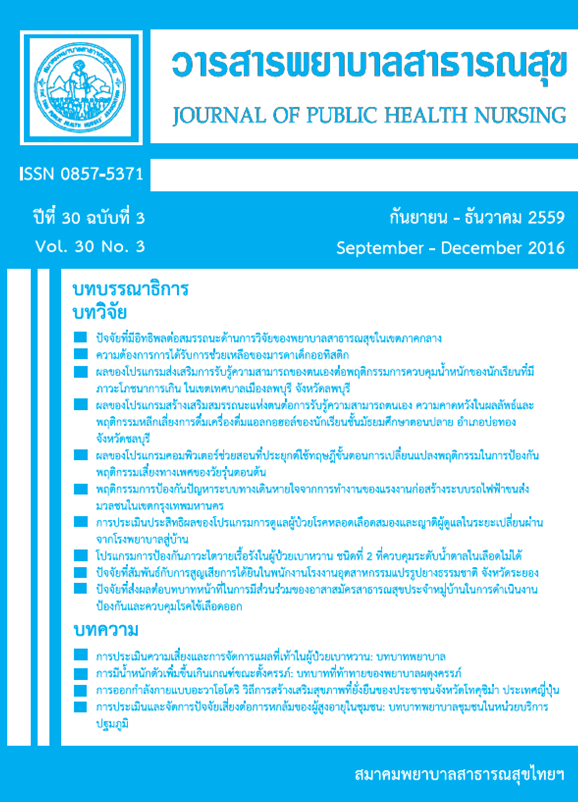การประเมินประสิทธิผลของโปรแกรมการดูแลผู้ป่วยโรคหลอดเลือดสมองและญาติผู้ดูแลในระยะเปลี่ยนผ่านจากโรงพยาบาลสู่บ้าน
Keywords:
การดูแลระยะเปลี่ยนผ่าน, ผู้ป่วยโรคหลอดเลือดสมอง, ญาติผู้ดูแล โรงพยาบาล, บ้าน, Transitional care, Stroke patient, Caregivers, Hospital, HomeAbstract
การศึกษาครั้งนี้เป็นการวิจัยแบบกึ่งทดลอง เพื่อศึกษาประสิทธิผลของโปรแกรมการดูแลผู้ป่วยโรคหลอดเลือดสมองและญาติผู้ดูแลในระยะเปลี่ยนผ่านจากโรงพยาบาลสู่บ้าน โดยใช้การดูแลระยะเปลี่ยนผ่านตามแนวคิดของเนเลอร์ (Naylor, 2006) เป็นกรอบแนวคิดในการศึกษาครั้งนี้ คัดเลือกกลุ่มตัวอย่างผู้ป่วยและญาติผู้ดูแลตามเกณฑ์ แบ่งเป็นกลุ่มควบคุม 34 คู่ และกลุ่มทดลอง 40 คู่ กลุ่มควบคุมได้รับการดูแลตามปกติ กลุ่มทดลองได้รับการดูแลตามปกติร่วมกับการดูแลตามโปรแกรม เครื่องมือที่ใช้ในการวิจัย ประกอบด้วย 1) โปรแกรมการดูแลผู้ป่วยโรคหลอดเลือดสมองและญาติผู้ดูแลในระยะเปลี่ยนผ่านจากโรงพยาบาลสู่บ้าน และ 2) เครื่องมือเก็บรวบรวมข้อมูล ได้แก่ แบบบันทึกข้อมูลส่วนบุคคลของผู้ป่วยและญาติผู้ดูแล แบบประเมินความสามารถในการปฏิบัติกิจวัตรประจำวัน แบบประเมินความพร้อมของญาติผู้ดูแล แบบประเมินภาวะแทรกซ้อนของผู้ป่วย แบบประเมินความมั่นใจในการดูแล แบบประเมินความเครียดของญาติผู้ดูแล แบบประเมินการปรับตัวของญาติผู้ดูแลแบบประเมินสัมพันธภาพระหว่างญาติผู้ดูแลและผู้ป่วย แบบประเมินคุณภาพชีวิตของญาติผู้ดูแล และแบบประเมินความพึงพอใจของผู้ป่วยและญาติผู้ดูแล วิเคราะห์ข้อมูลโดยใช้สถิติบรรยาย สถิติไคสแควร์ และสถิติที
ผลการศึกษา พบว่า ในระยะ 1 เดือน และ 3 เดือนหลังจำหน่าย ค่าเฉลี่ยคะแนนความสามารถในการทำกิจวัตรประจำวันของผู้ป่วย ความพร้อมของญาติผู้ดูแล และความพึงพอใจของผู้ป่วยและญาติผู้ดูแลในกลุ่มทดลองสูงกว่ากลุ่มควบคุมอย่างมีนัยสำคัญทางสถิติ และในระยะ 3 เดือนหลังจำหน่าย พบว่า ค่าเฉลี่ยคะแนนการปรับตัวและคุณภาพชีวิตของญาติผู้ดูแลในกลุ่มทดลองสูงกว่ากลุ่มควบคุมอย่างมีนัยสำคัญทางสถิติ และค่าเฉลี่ยคะแนนความเครียดของญาติผู้ดูแลในกลุ่มทดลองลดลงอย่างมีนัยสำคัญทางสถิติ
การศึกษาครั้งนี้ชี้ให้เห็นว่าโปรแกรมดังกล่าวสามารถนำไปปรับใช้กับการดูแลผู้ป่วยโรคหลอดเลือดสมองและญาติผู้ดูแลในระยะเปลี่ยนผ่านจากโรงพยาบาลสู่บ้านได้
EFFECTIVENESS OF TRANSITIONAL CARE PROGRAM FOR STROKE PATIENTS AND FAMILY CAREGIVERS FROM HOSPITAL TO HOME
The purpose of this quasi-experimental research was to investigate the effectiveness of the transitional care program for stroke patients and family caregivers from hospital to home, using Transitional Care Model developed by Naylor (2006) as a framework. The purposive sampling in this study was composed of 34 pairs of stroke patients and caregivers (the control group) and 40 pairs of stroke patients and caregivers (the experimental group). The control group received the standard care while the experimental group received standard care plus the transitional care program. Research instruments were composed of the transitional care program and questionnaires including Demographic Data of Stroke Patient and Caregiver Questionnaire, Barthel Index of Activities of Daily Living, Preparedness Scale, Complication Questionnaire, Self-Efficacy Scale, Caregiver Stress Scale, Adaptation Scale, Mutuality Scale, Quality of Life Index, and Satisfaction Scale. Data were analyzed, using descriptive statistics, Chi-square, and t-test. The results revealed that at 1 month and 3 months after discharge, the mean scores of patient’s activities of daily living, caregiver preparedness, and patient and caregiver’s satisfaction in the experimental group were significantly higher than those in the control group. Moreover, at 3 months after discharge, the mean scores of caregiver adaptation and quality of life of caregivers were significantly higher than those in the control group; and the mean score of caregiver stress in the experimental group was significantly lower than that in a 1 month after discharge. Therefore, this transitional care program could be applied for caring stroke patients and their family caregivers during the transition from hospital to home.
Downloads
How to Cite
Issue
Section
License
บทความที่ตีพิมพ์และแผนภูมิรูปภาพถือเป็นลิขสิทธิ์ของวารสารพยาบาลสาธารณสุข (Thai Public Health Nurses Association)







